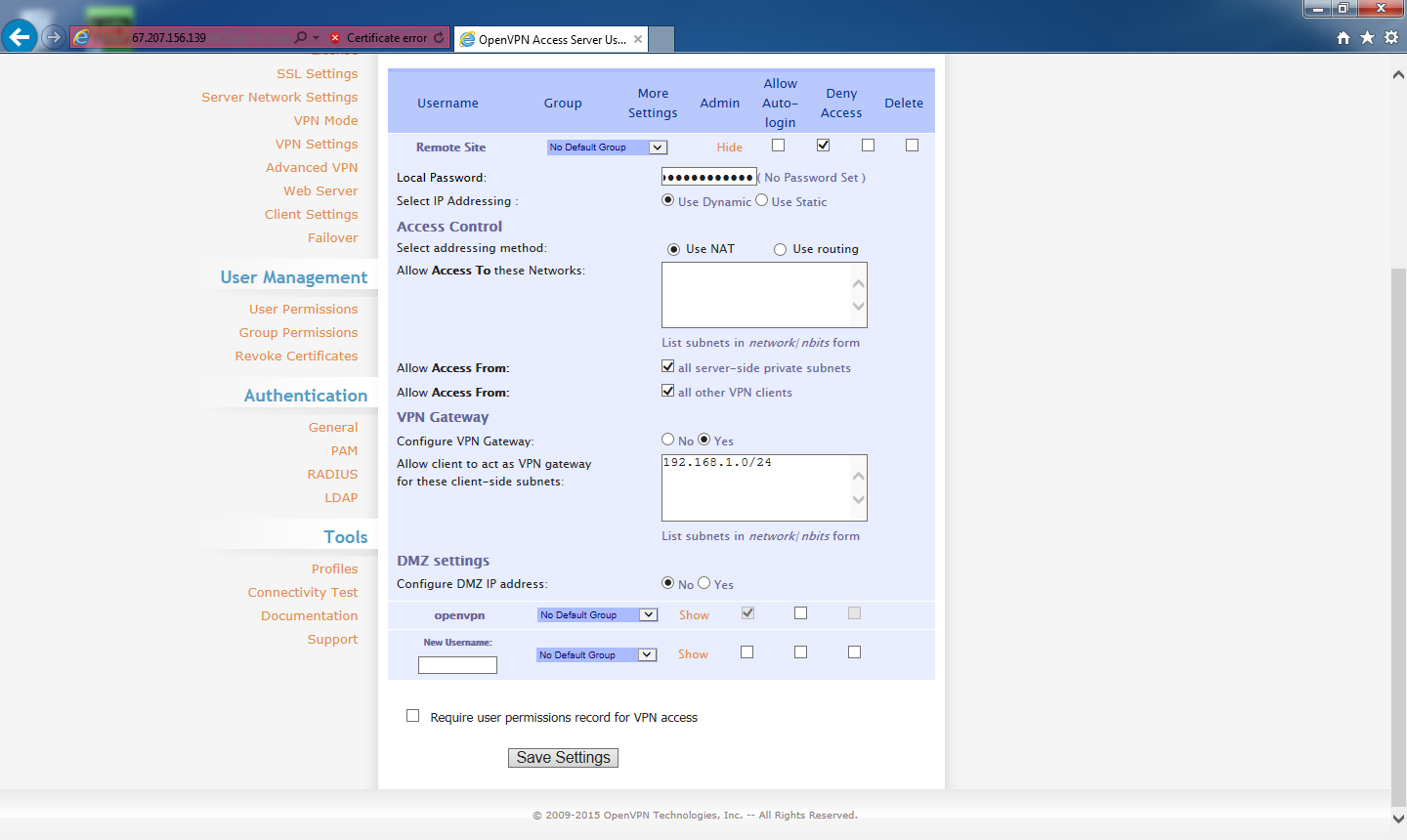OpenVPN access server is a tool that allows for the rapid installation & configuration of a VPN server. It is commercial software however the ‘free’ license allows for 2 concurrent connections.

What you’ll want is the OpenVPN Access server, which is installable as a package and comes with a web interface for managing your VPN’s settings. It’s free for two simultaneous connections, which should be enough for the simple use case of managing servers behind a firewall. OpenVPN First Time Access - This is a shortcut to that will help you get started. It will open the webpage in your computer's default web browser. It will open the webpage in your computer's default web browser. The EdgeRouter OpenVPN server provides access to the LAN (192.168.1.0/24) for authenticated OpenVPN clients. CLI: Access the Command Line Interface. You can do this using the CLI button in the Web UI or by using a program such as PuTTY. Make sure that the date/time is set correctly on the EdgeRouter.
In this guide I am going to show you how to configure the access server, generate certificates for your domain & automatically renew them every 3 months.
Requirements:

- A domain name pointing to your external IP, I will be using ‘example.com’.
- A computer running linux (Open VPN access server has not been built for ARM therefore it cannot be a raspberry pi), the internal server/computer will need a static IP to ensure there are no port forwarding issues.
All of the commands in this guide will need to be run as ‘root (sudo -s)’
For more information on other distributions the information can be found here: https://openvpn.net/vpn-software-packages/
Once installation is completed we need to create a password for the user ‘openvpn’ using the command:
Openvpn Access Server Free
We then need to login to the admin portal (https://your-server-ip:943/admin).
You will get an ‘not secure’ warning as the server is currently running on self-signed certificates. This will be resolved in the following steps. Microsoft monthview control 6 0 excel 2010 missing.
On the portal go to: Configuration > Network Settings and change hostname to your domain name (example.com) as shown in Figure 1.
Click save at the bottom and then ‘update running server’ (Figure 2)
To ensure you can access your Open VPN Server from outside you will need to forward the following ports on your firewall.
Certbot is an easy to use client that fetches a certificate from Let’s Encrypt and deploys it to a server. More information here (https://certbot.eff.org/)
Deool band marathi movie full song download. To install Certbot on Ubuntu:
Once Certbot has been installed you can generate certificates for your domain using the following command:
The generated certificates will automatically be installed under /etc/letsencrypt/live/example.com as fullchain.pem & privkey.pem
If you have any errors common reasons include:
- Your DNS name is not currently pointing to your external IP. Check this with your domain provider.
- If you have a NAT/Firewall port 80 tcp may be blocked (check your firewall rules and/or router configuration).
- Make sure no other service is running on port 80 as Lets Encrypt uses it to for the http challenge. There are workarounds such as DNS challege or Nginx/Apache Plugins.
- Make sure you’re running commands as root
OpenVPN access server requires the certificates to be installed in it’s database, this can be done through the web interface or via the command line. As you have to renew Lets Encrypt certificates every three months we need to use the command line to ensure everything can be automated (step 3).
The following commands will install the certificates into the OpenVPN database:
#Install certificates & restart server

If everything is successful you should be able to browse example.com and have a secure login page with no certificate errors (Figure 3).
If you click on the lock & certificate you will be presented with the following window providing certificate information (Figure 4):

As mentioned previously in this guide, Lets Encrypt certificates expire every 3 months. To save us from having to renew & reinstall them manual we can create a simple bash script and schedule it using cron which is a time-based job scheduler.
Openvpn Access Server Api
- Copy the code below using a text editor of your choice into /usr/local/sbin/certrenewal.sh:
2. Make the script Executable:

Openvpn Access Server Gui
3. Enter Cron editor as root:
This will schedule the script to run 'At 00:00 on day-of-month 1 in every 2nd month.'
(Crontab guru is great for determining expressions)
Install Openvpn Access Server Ubuntu
You can find me on the following: